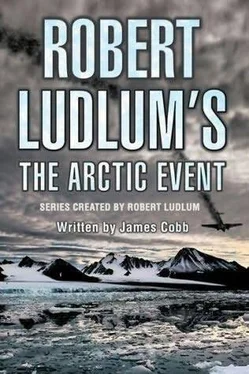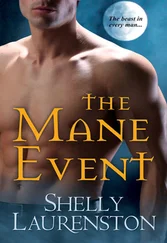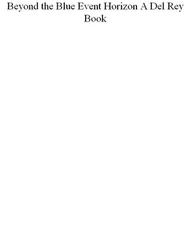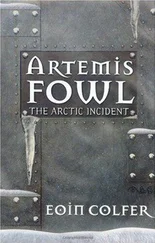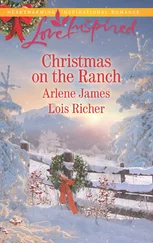“Penny for your thoughts, Jon?” Valentina said softly.
Smith shot an angled glance toward the lowering northern sky. “We’ve got another front coming in.”
“It will be interesting to see which arrives first: the weather or the sunset. Granola bar?”
“No, thanks.”
The colonel and the historian lay side-by-side in the shadow and shelter of the cave mouth, watching the approaches across the glacier. Since the initial identification and elimination of the first Spetsnaz scout there had been no movement on the ice. There was only the sensation of activity, born out of the knowledge that a hostile force was upon them, an enemy that would not sit back passively and allow them to live.
Smith looked across at the odd other half of his rifle team as she munched her snack in seeming contentment. Her fine-planed, rather exotic features were relaxed within the shelter of her parka hood. “You doing all right?” he inquired.
“Oh, yes. Quite good.” She glanced around at the black rock walls and roof of the tunnel. “It’s not exactly Cancun, but I can see marvelous development potential for winter sports.”
Smith chuckled softly and reset his attention on the cave approaches. A remarkable lady.
“Mind answering a question?” he asked.
“Why not?”
“What is that accent? It’s not quite English and not quite Australian. I can’t place it.”
“It’s from a country that doesn’t exist anymore,” she replied. “I was born in Rhodesia-not Zimbabwe, if you please, but Rhodesia. My father was a government game control officer there before Mugabe took over.”
“And your mother?”
“An American near-zoologist. She’d been a graduate student doing research on African wildlife, but what with one thing or another, such as marrying Dad, she never went back to the States to finish her degree.”
Valentina frowned for a moment at some flash of memory. “It did give me dual citizenship, which proved rather handy when things went to their final hell back home. I was able to refugee to America to live with my mother’s family after…well, after.”
“I see. And how did you get here?”
She glanced at him, her lips pursed thoughtfully. “Doesn’t that question violate mobile cipher compartmentalization or something? Like the old ‘one question you cannot ask’ in the Foreign Legion?”
Smith shrugged. “Damned if I know. But you’re the one who said we were destined to become lovers. The question is probably going to come up again.”
“Valid point,” she agreed, looking back to the ice. “It’s a long and rather meandering story. As I said, my father was a game control officer and the commander of our local territorial commando-a hunter, a scholar, and a soldier, who probably would have been much happier living as a contemporary of Cecil Rhodes and Frederick Selous. I was born in a war zone and raised in a household where weapons were a fact and a necessity of life. My earliest memories are of the sound of gunfire beyond our compound. I was given a rifle at an age when most little girls in America were still being given Barbie dolls, and I shot my first leopard while it was trying to climb in through my bedroom window.”
She glanced wryly at Smith. “To say the least, I grew up with a somewhat different worldview than is the norm.”
He tilted his head in an acknowledging nod. “I can see how that could happen.”
“My father loved history and about learning how things came to be,” she continued. “He’d say, ‘To learn where you’re going, you have to know where you’ve come from.’ He put that love into me, and I majored in world history at college. My doctoral paper was titled The Cutting Edge: Armaments Technology as a Guiding Force in Sociopolitical Evolution. Later I expanded it into my first book.”
“Sounds like an impressive topic.”
“Oh, it is, and a valid one.” Valentina’s voice began to take on a lecturer’s enthusiasm. “Consider how different Europe might be today if the English longbow had not proven decisively superior to the French arbalest at the Battle of Agincourt. Or how World War Two might have played out had the Japanese not developed the shallow-water drop shroud for their aerial torpedoes, permitting the attack on Pearl Harbor. Or how the United States might never have come to exist had the British Army put Major Ferguson’s breech-loading rifle into general issue during the Revolutionary War…”
Smith laughed softly and lifted a gloved hand. “Points taken, but it’s still your history I’m interested in.”
“Oops, sorry, Pavlovian reflex. At any rate, after receiving my doctorate, I found I couldn’t get a decent teaching position. My views were considered somewhat un-PC in certain quarters. So, to stave off starvation, I became an authenticator, appraiser, and procurer of rare and historic weapons for museums and private collectors. It turned into a rather lucrative profession, and I found myself roving all over the world, chasing down various finds for my clients. Eventually it led to my curatorship of the Sandoval Arms Collection in California.”
“I’ve heard of it. But how did you get here ?” Smith prodded gently, tapping the magazine of his leveled rifle on the cave floor.
She bit her lip lightly for a moment, the introspective look deepening in her eyes. “That’s…a little more esoteric. As you should have guessed by now, I am a firm member of the ‘If it’s worth doing it’s worth overdoing’ school of thought.”
“I’ve had my suspicions.” Smith smiled.
“As my education developed I found I was not content to merely study about weapons. I wanted to learn how to use them and to see and feel how they were applied,” she continued. “I studied fencing and kendo. I learned the skills of the old Western gunfighters from the champion shootists of the Single Action Shooting Society. I bribed my way into Philippine prison cells to discuss technique with butterfly-knife artists. Before his untimely death I sat at the feet of the legendary ‘White Feather,’ Marine master sniper Sergeant Carlos Hathcock, and learned combat marksmanship. Firearms, blades, explosives, military heavy weapons: I learned how to make them, maintain them, and employ them. Everything from the flint axe to the H-bomb.”
She lifted her hand from the action of the model 70 and flexed her black-gloved fingers, studying them. “I found myself becoming a uniquely lethal individual, all on a purely theoretical level, of course. But then I visited Israel, following up a lead on a cache of genuine ‘garage factory’ Sten guns from their War of Independence. And one evening I found myself having dinner with a fellow historian from Tel Aviv University.”
Valentina’s voice grew softer. “He was a totally fascinating little man who not only taught history but had lived it. He was a holocaust survivor and had seen action in the first three of Israel’s wars of national survival.
“We were dining at a small outdoor restaurant near the University. I recall we were discussing the historic Mideastern Jewish communities as a possible bridge between the European Jewish and Arabic cultures. Our meals had just been brought to the table. I’d ordered steak and I’d just picked up my knife when the smartly-dressed Arabic couple at the next table stood up and started killing people.”
Smith listened and studied the subtle emotions playing across Valentina’s face. He could sense it wasn’t the remembering of a fear or revulsion, but an abstract reexamination of a defining moment in a life. A time and place this woman had revisited many times before.
“I heard gunshots and I was sprayed by the blood and brains of my dinner partner as he took a bullet through the head. Then the female terrorist shoved her pistol in my face and screamed ‘God is great…’”
Читать дальше
